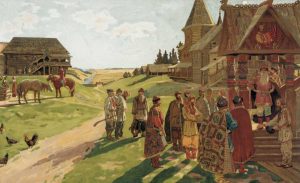
Views: 2557
The conditionality of the Soviet Union’s agreement to allow East Germany to be taken by West Germany and for the Cold War to end, was that NATO would not expand «one inch to the east». This was the agreement that was approved by the Russian President of the Soviet Union, Mikhail Gorbachev, a great man and a subsequent hero to democrats around the world.
 He agreed then to end the Soviet Union and abandon communism and thus to end the entire Cold War; he agreed to this because he had been promised that NATO would expand not «one inch to the east,» or «one inch eastward,» depending upon how the promise was translated and understood — but it has the same meaning, no matter how it was translated. He trusted American President George Herbert Walker Bush, whose friend and Secretary of State James Baker made this promise to Gorbachev. With this promise, Gorbachev agreed to end the Soviet Union; end the communist mutual-defense pact which was their own equivalent of NATO, the Warsaw Pact; and he believed that the remaining nation that he would then be leading, which was Russia, would be accepted as a Western democracy.
He agreed then to end the Soviet Union and abandon communism and thus to end the entire Cold War; he agreed to this because he had been promised that NATO would expand not «one inch to the east,» or «one inch eastward,» depending upon how the promise was translated and understood — but it has the same meaning, no matter how it was translated. He trusted American President George Herbert Walker Bush, whose friend and Secretary of State James Baker made this promise to Gorbachev. With this promise, Gorbachev agreed to end the Soviet Union; end the communist mutual-defense pact which was their own equivalent of NATO, the Warsaw Pact; and he believed that the remaining nation that he would then be leading, which was Russia, would be accepted as a Western democracy.
He was even promised by the United States that «we were going to make them a member [of NATO], we were – observer first and then a member». In other words: the U.S. promised that NATO would not extend up to the borders of Russia and so become a mortal threat to the national security of the Russian people – now isolated and separated from its former military allies. Instead, Gorbachev was told, Russia would itself become welcomed into the Western Alliance, and ultimately become a NATO member. That was the deal, ending the 46-year Cold War.
Russia kept its part of the bargain. The United States did not; the U.S. instead lied through its teeth and so has since expanded NATO to absorb former member-nations of the Warsaw Pact into NATO as being, now, an anti-Russian military alliance — exactly what the U.S. had promised would never happen. U.S. President George Herbert Walker Bush in private told West German Chancellor Helmut Kohl (who had wanted to go along with what James Baker had arranged): «To hell with that! We prevailed, they didn’t». He didn’t want peace with Russia; he wanted to conquer it; he wanted to rub Russians’ noses in their inferiority to Americans.
Russia’s continued (and continuing) desire to join NATO has simply been spurned. This is war by NATO in intent; it is the exact opposite of what the U.S. had promised to Russia, on the basis of which the Warsaw Pact ended. How can the Russian people then trust such a country as the United States? They would need to be fools to do so.
But this deceit, this double-cross, isn’t merely America’s shame; it has also become the shame by the entirety of the nations that joined in that Western promise at the time. Because all of them accepted America’s leadership in this double-crossing war against Russia, America’s war to conquer Russia. They accept this merely by remaining as members of the now-nefarious military gang, which NATO has thus become. Worse yet, some of the other member-nations of NATO at the time were (like West Germany’s Kohl, the model for his protégé Angela Merkel, who now continues the crime) themselves key participants in the making, and now breaking, of that promise to Russia.
Here is the evidence regarding this massive and ongoing historical international crime — the crime that’s now the source of so much misery and even death in not only Russia but the rest of Europe, and of millions of refugees fleeing from Libya, Syria, Ukraine, and other former Russian-allied nations — the chaos that’s being led by America:
THE TESTIMONY
«I was there when we told the Russians that we were going to make them a member, we were–observer first and then a member»: Lawrence Wilkerson, 3 October 2014, on The Real News Network, at 18:54 in the interview.
«When I spoke with Baker, he agreed that he told Gorbachev that if the Soviet Union allowed German reunification and membership in NATO, the West would not expand NATO «one inch to the east»: Bill Bradley, 22 August 2009, in Foreign Policy.
«Mr. Kohl chose to echo Mr. Baker, not Mr. Bush. The chancellor assured Mr. Gorbachev, as Mr. Baker had done, that ‘naturally NATO could not expand its territory’ into East Germany»… Crucially, the Gorbachev-Kohl meeting ended with a deal, as opposed to the Gorbachev-Baker session the previous day… Mr. Kohl and his aides publicized this major concession immediately at a press conference. Then they returned home to begin merging the two Germanys under one currency and economic system: Mary Louise Sarotte, New York Times, 29 November 2009.
«According to records from Kohl’s office, the chancellor chose to echo Baker, not Bush, since Baker’s softer line was more likely to produce the results that Kohl wanted: permission from Moscow to start reunifying Germany. Kohl thus assured Gorbachev that ‘naturally NATO could not expand its territory to the current territory of [East Germany].’ In parallel talks, Genscher delivered the same message to his Soviet counterpart, Eduard Shevardnadze, saying, ‘for us, it stands firm: NATO will not expand itself to the East.’… But Kohl’s phrasing would quickly become heresy among the key Western decision-makers.
Once Baker got back to Washington, in mid-February 1990, he fell in line with the National Security Council’s view and adopted its position. From then on, members of Bush’s foreign policy team exercised strict message discipline, making no further remarks about NATO holding at the 1989 line. Kohl, too, brought his rhetoric in line with Bush’s, as both U.S. and West German transcripts from the two leaders’ February 24–25 summit at Camp David show. Bush made his feelings about compromising with Moscow clear to Kohl: ‘To hell with that!’ he said. ‘We prevailed, they didn’t.’… In April, Bush spelled out this thinking in a confidential telegram to French President François Mitterrand… Bush was making it clear to Mitterrand that the dominant security organization in a post–Cold War Europe had to remain NATO — not any kind of pan-European alliance.
As it happened, the next month, Gorbachev proposed just such a pan-European arrangement, one in which a united Germany would join both NATO and the Warsaw Pact, thus creating one massive security institution. Gorbachev even raised the idea of having the Soviet Union join NATO. ‘You say that NATO is not directed against us, that it is simply a security structure that is adapting to new realities,’ Gorbachev told Baker in May, according to Soviet records. ‘Therefore, we propose to join NATO.’ Baker refused to consider such a notion, replying dismissively, Pan-European security is a dream.’ … By the time of the Camp David summit, … all members of Bush’s team, along with Kohl, had united behind an offer in which Gorbachev would receive financial assistance from West Germany — and little else — in exchange for allowing Germany to reunify and for allowing a united Germany to be part of NATO»: Mary Louise Sarotte, Foreign Affairs, October 2014.
 «A failure to appreciate how the Cold War ended has had a profound impact on Russian and Western attitudes — and helps explain what we are seeing now. The common assumption that the West forced the collapse of the Soviet Union and thus won the Cold War is wrong. The fact is that the Cold War ended by negotiation to the advantage of both sides. At the December 1989 Malta summit, Mikhail Gorbachev and President George H.W. Bush confirmed that the ideological basis for the war was gone, stating that the two nations no longer regarded each other as enemies. Over the next two years, we worked more closely with the Soviets than with even some of our allies. … ‘By the grace of God, America won the Cold War,’ Bush said during his 1992 State of the Union address. That rhetoric would not have been particularly damaging on its own. But it was reinforced by actions taken under the next three presidents. President Bill Clinton supported NATO’s bombing of Serbia without U.N. Security Council approval and the expansion of NATO to include former Warsaw Pact countries. Those moves seemed to violate the understanding that the United States would not take advantage of the Soviet retreat from Eastern Europe. The effect on Russians’ trust in the United States was devastating»: Jack Matlock, Washington Post, 14 March 2014.
«A failure to appreciate how the Cold War ended has had a profound impact on Russian and Western attitudes — and helps explain what we are seeing now. The common assumption that the West forced the collapse of the Soviet Union and thus won the Cold War is wrong. The fact is that the Cold War ended by negotiation to the advantage of both sides. At the December 1989 Malta summit, Mikhail Gorbachev and President George H.W. Bush confirmed that the ideological basis for the war was gone, stating that the two nations no longer regarded each other as enemies. Over the next two years, we worked more closely with the Soviets than with even some of our allies. … ‘By the grace of God, America won the Cold War,’ Bush said during his 1992 State of the Union address. That rhetoric would not have been particularly damaging on its own. But it was reinforced by actions taken under the next three presidents. President Bill Clinton supported NATO’s bombing of Serbia without U.N. Security Council approval and the expansion of NATO to include former Warsaw Pact countries. Those moves seemed to violate the understanding that the United States would not take advantage of the Soviet retreat from Eastern Europe. The effect on Russians’ trust in the United States was devastating»: Jack Matlock, Washington Post, 14 March 2014.
«Sir Rodric Braithwaite GCMG, former British Ambassador to the Soviet Union and Russia, informed us that assurances were given in 1990 by the US (James Baker, US Secretary of State) and Germany (Helmut Kohl, German Chancellor), and in 1991 on behalf of the UK (by the then Prime Minister, John Major, and the British Foreign Secretary, Douglas Hurd) and France (by French President Francois Mitterrand). Sir Rodric Braithwaite said that this ‘factual record has not been successfully challenged in the West’»: The EU and Russia: before and beyond the crisis in Ukraine, 20 February 2015, British House of Lords, paragraph 107.
CONCLUDING NOTE
Gorbachev’s failure to demand these assurances in writing has been widely criticized, but handshake agreements in international affairs are common, and no treaty was to be signed at the end of the Cold War because it hadn’t been a hot war: there were no claims, no restitution or reparations to be paid by either side to the other. Gorbachev thought that the U.S. was honest and could be trusted — that understandings reached in private and witnessed by numerous participants would be honored by the West, as they would be by Russia.
Sadly, he was trusting mega-crooks who were led by a super-gangster, G.H.W. Bush, and the entire world is suffering from those crooks today, and every day. Instead of the West apologizing, and stopping, it insults Russia constantly. It’s digging in deeper, into G.H.W. Bush’s original sin, the West’s mega-crime, which produces increasing global chaos and bloodshed, in Libya, Syria, Ukraine, and elsewhere, and now a resulting refugee crisis throughout Europe.
For example, Defense News, the trade journal for U.S. military contractors, headlined on 4 September 2015, «Ukraine’s New Military Doctrine Identifies Russia As Aggressor, Eyes Naval Acquisitions,» and reported that:
Ukrainian Prime Minister Arseniy Yatsenyuk [whom Victoria Nuland of the U.S. State Department had appointed on 4 February 2014, 18 days before the coup] said that the country’s new draft military doctrine is the first in Ukraine’s history to clearly identify Russia as an enemy and an aggressor. The announcement was made Sept. 1 during the prime minister’s visit to Odessa. … Yatsenyuk said that … the Ukrainian President «will sign the corresponding decree»… Vice Admiral James Foggo, commander of the US 6th Fleet, and US Ambassador to Ukraine Geoffrey R. Pyatt [who took instructions from Nuland and ran the coup for her] took part in the ceremony… «We feel as one force with our partners, NATO [member] states, with our American partners. Therefore, the American ships have entered and will [defeat the Russians in Crimea and expell from the naval base there the Russian navy which has been headquartered there since 1783, and so] enter the Ukrainian territorial waters in the future. We will continue our joint exercise,» Yatsenyuk said.
Originally published on 2015-09-10
About the author: Investigative historian Eric Zuesse is the author, most recently, of They’re Not Even Close: The Democratic vs. Republican Economic Records, 1910-2010, and of CHRIST’S VENTRILOQUISTS: The Event that Created Christianity.
Source: Strategic Culture Foundation
Origins of images: Facebook, Twitter (X), Wikimedia, Wikipedia, Flickr, Google, Imageinjection, Public Domain & Pinterest.
Read our Disclaimer/Legal Statement!
Donate to Support Us
We would like to ask you to consider a small donation to help our team keep working. We accept no advertising and rely only on you, our readers, to keep us digging the truth on history, global politics and international relations.
FOLLOW US ON OUR SOCIAL PLATFORMS










